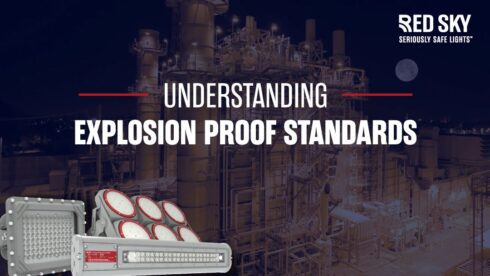Safety is paramount in environments where explosive gases, vapors, or dust pose a risk. Explosion-proof standards ensure that equipment and systems used in these hazardous locations operate safely without triggering accidents. These standards are critical for industries like oil and gas, chemical processing, and manufacturing, where the potential for catastrophic explosions looms large.
Explosion-proof equipment is designed to:
- Contain internal explosions within the device.
- Prevent sparks, heat, or flames from escaping.
- Resist environmental challenges such as dust, moisture, and high temperatures.
Certifying organizations like UL (Underwriters Laboratories) and Intertek are instrumental in setting these safety benchmarks. Their rigorous testing processes provide businesses with the confidence to operate safely and comply with regulatory requirements.
UL Explosion-Proof Standards
UL is a globally recognized leader in safety certification, providing stringent testing for hazardous location equipment. Their explosion-proof standards are particularly prominent in North America and extend to international markets.
Key Features of UL Standards:
- Spark Containment: UL tests equipment to ensure no sparks or heat escape, preventing potential ignition.
- Durability Testing: Products are subjected to extreme conditions to verify their ability to operate reliably in harsh environments.
- Comprehensive Certifications: UL provides marks such as UL Listed and UL Classified, signifying compliance with specific safety standards.
Global Reach of UL:
UL also supports manufacturers in obtaining ATEX and IECEx certifications, essential for compliance in European and other international markets. This capability makes UL a versatile partner for businesses aiming to ensure global compliance.
Intertek and ATEX Certification
Intertek is another renowned name in explosion-proof certification, with expertise in European Union standards, particularly the ATEX directive.
What is ATEX Certification?
ATEX (Atmosphères Explosibles) is a European directive that mandates safety requirements for equipment used in explosive atmospheres. Intertek’s testing process ensures that:
- Equipment can withstand high temperatures.
- Internal explosions are contained effectively.
- Dust and moisture ingress is minimized.
Intertek’s Global Certification Services:
Beyond ATEX, Intertek offers IECEx certification, recognized in over 30 countries. Their ETL mark provides assurance of safety and compliance for North American markets.
Comparing UL and Intertek Certifications
Both UL and Intertek are trusted names in explosion-proof standards, but they cater to slightly different needs:
- UL: Primarily focuses on North American standards but extends to global certifications like ATEX and IECEx.
- Intertek: Specializes in European standards, particularly ATEX, and provides global services through IECEx and ETL certifications.
Each organization conducts rigorous testing to ensure equipment meets the highest safety standards, providing peace of mind to manufacturers and users alike.
Why Adhering to Explosion-Proof Standards is Crucial
Explosion-proof standards are not just a regulatory requirement—they are vital to protecting lives and infrastructure. Here’s why they matter:
- Safety Assurance: Properly certified equipment minimizes risks of explosions, safeguarding personnel and property.
- Regulatory Compliance: Businesses that meet standards like UL, ATEX, and IECEx avoid legal penalties and ensure smooth operations.
- Market Access: Certified products are more likely to gain approval in international markets, enhancing their competitiveness.
- Reputation: Using certified equipment signals a commitment to safety and quality, boosting a company’s credibility.
Choosing the Right Explosion-Proof Equipment
When selecting explosion-proof equipment, consider the following:
- Ensure the product is certified by a recognized body like UL or Intertek.
- Verify compatibility with your specific hazardous environment (e.g., dust, gas, or vapor risks).
- Look for marks such as UL Listed, UL Classified, ATEX, or IECEx, depending on the market you operate in.
Investing in certified equipment ensures safety, regulatory compliance, and long-term operational efficiency.
Frequently Asked Questions
What are explosion-proof standards?
Explosion-proof standards are guidelines ensuring equipment can operate safely in hazardous locations without igniting flammable substances.
Who certifies explosion-proof Lighting?
Organizations like UL and Intertek provide certification services, ensuring equipment meets stringent safety requirements.
What is the difference between ATEX and IECEx?
ATEX is a European directive for explosion-proof safety, while IECEx is an international certification recognized in over 30 countries.
Why are UL and Intertek certifications important?
Both UL and Intertek conduct rigorous tests to ensure equipment safety, enhancing reliability and market acceptance.
What industries need explosion-proof equipment?
Industries like oil and gas, chemical processing, mining, and manufacturing rely on explosion-proof equipment for safety and compliance.
How does explosion-proof Lighting work?
Explosion-proof equipment contains internal explosions, prevents spark escape, and resists harsh environmental factors to ensure safe operation.
Conclusion
Understanding explosion-proof standards is crucial for ensuring safety in hazardous environments. Certifications from UL, Intertek, ATEX, and IECEx provide a robust framework for compliance and operational excellence. By adhering to these standards, businesses can protect their workforce, infrastructure, and reputation while accessing global markets confidently.
